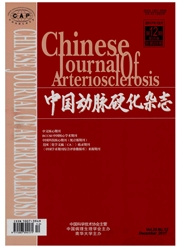

 中文摘要:
中文摘要:
目的探讨ST段抬高型心肌梗死(STEMI)患者CD147基因3’非翻译区(UTR)rs8259位点多态性,并观察CD147的基因型及其血浆水平与STEMI的相关性。方法以162例STEMI患者和328例正常对照者作为研究对象,应用聚合酶链反应-限制性片长多态性(PCR-RFLP)技术和DNA测序法检测CD147基因rs8259位点的基因型,酶联免疫吸附实验(ELISA)检测血浆CD147水平。结果 STEMI组血浆CD147水平(4.18±0.95 pg/L)显著高于对照组(2.55±0.29 pg/L)(P〈0.01)。CD147基因rs8259位点存在3种基因型(AA、AT、TT),基因型和等位基因频率在STEMI组和对照组分布差异有显著性(P〈0.05)。对多个危险因素行Logistic回归分析显示AT基因型(OR=0.346,95%CI:0.210~0.569,P〈0.05)和TT基因型(OR=0.107,95%CI:0.046~0.251,P〈0.05)能降低STEMI发病易感性的风险。T等位基因携带者患STEMI的相对风险度明显降低(OR=0.543,95%CI:0.404~0.730,P〈0.05)。A等位基因携带者患STEMI的相对风险度升高(OR=1.841,95%CI:1.370~2.464,P〈0.05),携带T等位基因的STEMI患者血浆CD147水平相比于不携带者明显降低(P〈0.05)。结论 CD147基因3’UTR rs8259 A等位基因可能是STEMI发病的易感基因;AA基因型促进CD147高表达进而增加STEMI发病风险,携带T等位基因通过降低CD147表达而降低STEMI的发病风险。
 英文摘要:
英文摘要:
Aim To analyze the polymorphism of the CD147 gene 3’UTR rs8259 in patients with ST-segment elevation myocardial infarction(STEMI),and to study the relation between plasma levels,genotype of CD147 and STEMI.Methods The polymorphism of CD147 was detected by polymerase chain reaction-restriction fragment length polymorphism(PCR-RFLP) and DNA sequencing method in 162 STEMI patients and 328 healthy persons. The plasma level of CD147 was determined by enzyme-linked immunosorbent assay( ELISA). Results STEMI group(4. 18 ± 0. 95pg /L) showed significantly higher plasma level of CD147 than control group(2. 55 ± 0. 29 pg /L)( P 〈 0. 01). There was a significant difference in frequencies of alleles and genotypes in 3’UTR rs8259 of CD147 with three genotypes AA,AT and TT existed(P 〈 0. 05). Logistic regression analysis for adjusting other risk factors displayed that AT genotypes(OR= 0. 346,95% CI: 0. 210 ~ 0. 569,P 〈 0. 05) and TT genotypes(OR = 0. 107,95% CI: 0. 046 ~ 0. 251,P 〈 0. 05) can decrease the relative risk of STEMI. Allele T carriers had low onset risk for STEMI( OR = 0. 543,95% CI: 0. 404 ~0. 730,P 〈 0. 05),and allele A carriers had high risk for STEMI(OR = 1. 841,95% CI: 1. 370 ~ 2. 464,P 〈 0. 05).The plasma level of CD147 was the highest in AA genotype(P 〈 0. 05). Conclusions CD147 gene 3’UTR rs8259 allele A is probably the susceptible gene of STEMI. AA genotype can be at increased risk of STEMI due to enhancing the CD147 expression and allele T may be protective for STEMI.
 同期刊论文项目
同期刊论文项目
 同项目期刊论文
同项目期刊论文
 Regression of atherosclerotic plaques after lentivirus-mediated RNA interference of Cyclophilin A in
Regression of atherosclerotic plaques after lentivirus-mediated RNA interference of Cyclophilin A in OX40-OX40L Interaction Promotes Proliferation and Activation of Lymphocytes via NFATc1 in ApoE-Defic
OX40-OX40L Interaction Promotes Proliferation and Activation of Lymphocytes via NFATc1 in ApoE-Defic Effect of OX40-OX40L interaction on the nuclear factor of activated T cells c1 in apoE-deficience mi
Effect of OX40-OX40L interaction on the nuclear factor of activated T cells c1 in apoE-deficience mi The clinical implications of increased cyclophilin A levels in patients with acute coronary syndrome
The clinical implications of increased cyclophilin A levels in patients with acute coronary syndrome Association Study between an SNP in CD147 and Its Expression With Acute Coronary Syndrome in a Jiang
Association Study between an SNP in CD147 and Its Expression With Acute Coronary Syndrome in a Jiang Clinical implications of elevated serum soluble CD137 levels in patients with acute coronary syndrom
Clinical implications of elevated serum soluble CD137 levels in patients with acute coronary syndrom The effect of CD137-CD137 ligand interaction on the expression of NFATc1 in apolipoprotein E-deficie
The effect of CD137-CD137 ligand interaction on the expression of NFATc1 in apolipoprotein E-deficie Effects of OX40-OX40L Interaction on the nuclear factor of activated T cells c1 in apoE-deficient mi
Effects of OX40-OX40L Interaction on the nuclear factor of activated T cells c1 in apoE-deficient mi The effect of CD137-CD137 ligand interaction on phospholipase C signaling pathway in human endotheli
The effect of CD137-CD137 ligand interaction on phospholipase C signaling pathway in human endotheli 期刊信息
期刊信息
